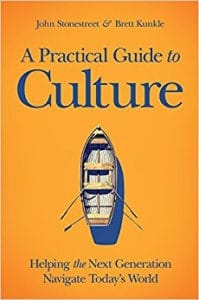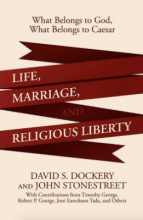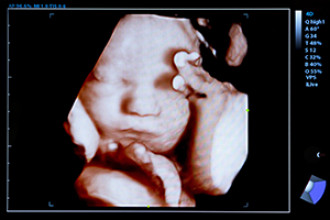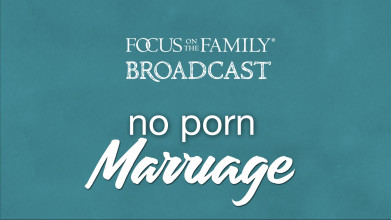John Stonestreet: God not only offers us truth, He offers us life and life more abundant. And when you go with His plan, it’s gonna work out better: For you, for me, for our families, for our kids, for our entire civilization. So, we fight for these things because they’re true.
John Fuller: That’s John Stonestreet sharing his thoughts about the always-changing culture and our place in it as believers in Christ. And there is a lot to navigate in the world we live in. He’ll help us be faithful to share the love of Christ without compromising a biblical worldview. This is Focus on the Family with your host, Focus president and author Jim Daly. And I’m John Fuller.
Jim Daly: John, we’re gonna shine a spotlight on some foundational truths that we just can’t afford to lose in the culture. 10 years ago, Chuck Colson led the way in drawing up a declaration to address three key issues in the culture – life, marriage, and religious freedom. Within months, over a half a million people – I think it was 550,000 people – signed the Manhattan Declaration. Now, 10 years later, John Stonestreet is the president of the Chuck Colson Center for Christian Worldview, and he is reaffirming those commitments to life, marriage, and religious freedom, all of which we at Focus on the Family support as well. And that’s why we’ve invited him here to speak with us about these issues and help us keep our bearings in this ever-changing culture around us.
John F.: And John has co-written a great book to help us as moms and dads to equip our kids in these challenging times so they can engage the culture and share the love of Christ. It’s called A Practical Guide to Culture: Helping the Next Generation Navigate Today’s World. We do have copies of it at focusonthefamily.com/broadcast.
John also has helped to compile writings from a number of religious leaders of the day, including Joni Eareckson Tada, Randy Alcorn, Mary Eberstadt, and many others, addressing the topics in a new book called Life, Marriage, and Religious Liberty. And that also is available at our website. Or call 800, the letter A, and the word FAMILY.
Jim: John, welcome back to Focus on the Family.
John S.: Thanks, Jim. It’s always good to be with you guys.
Jim: You heard that introduction. Share what Chuck Colson had on his heart when the Manhattan Declaration was conceived. Why is it important? And then, what motivates or drives you today in reaffirming those values?
John S.: Well, listen; I think Chuck had this sense that the lines of acceptability and culture were moving, and things that were kind of unthinkable would quickly become unquestionable. And we’ve all seen that, really, in our lifetime. And what he wanted really was not so much to have a kind of a Christian statement, yelling at culture, “Here’s what you should believe,” or, “Here’s what you should think.” He wanted for Christians to be really clear on three really controversial issues: The definition of life – when does life begin, and how do we protect life at all stages? The definition and importance. Sanctity of marriage. And that our conscience ultimately belongs to God, not belongs to Caesar. So, if you go back in 2009, what did we have? Culturally speaking, Roe v. Wade was, you know, 30-some years old. But this is before the Obergefell decision, which redefined marriage across the United States.
Jim: Yeah.
John S.: This was before the famous cases that we’ve seen recently about Jack Phillips and Barronelle Stutzman, others that are being forced to choose between their deeply held convictions and how they run their business in the public square. And – but he prophetically believed, along with Robbie George, a professor at Princeton University, and Timothy George, the dean of Beeson Divinity School, that there needed to be a statement of conscience. No matter what the culture says, this is where we have to stand. This is what God asked us to think on these fundamental issues. They acknowledged there were other issues. You talk about racism and talk about poverty, and you talk about justice reform – a lot of other issues. But these three, the Christians needed to be really clear on them in the coming years. And if you go back and say, “Here’s what happened in the last 10 years,” turns out they were right.
Jim: Yeah.
John S.: These are three very important issues. We needed the clarity.
Jim: They were just ahead of the curve, really, in some of the cultural shift in that regard. Let’s take a look at each one of them. When you get to the issue of life, I mean, that’s something that the culture is grappling with, still, in a very significant way.
John S.: And in new ways, right?
Jim: In new ways. You know, here at Focus on the Family, we are firmly rooted in the protection of the preborn child. And I cannot even conceive of a time that we’re going to move off of that position. And that’s been our 40 – over 40-year tradition at this ministry. We’re not gonna give up in protecting the voiceless. But speak to the culture, those shifts that have occurred. What would you say to pro-abortion advocates about the rights of the preborn? You know what? Let me say it this way, John. It’s so interesting in this culture, especially on those on the political left end of the spectrum, they’re there to protect everyone, except the preborn child.
John S.: Right.
Jim: I mean, it’s an amazing thing, almost so blatantly unwilling to protect the preborn child that it stands out like a sore thumb.
John S.: It really does.
Jim: What’s their problem with the baby in the womb?
John S.: Well, I think one of the things that is at the root of both the life issue and the religious liberty issue is that we’ve got a real collision in our culture between what has long been recognized as our – you know, basically the First Amendment – right? – religious freedom, our right to believe what we want, and that’s in collision with sexual freedom. And that’s really what we’re dealing with when it comes to abortion, as well. Is that, yeah, we want justice for everyone. But when it comes to sexuality, you know, that’s where we get really nervous of putting any restrictions whatsoever on people’s rights and freedoms. And abortion kind of provides that freedom at a whole new level, but it does so at the expense of a human life. And I’ll tell you what. Chuck Colson so appreciated the commitment that Focus on the Family has had for so long in protecting the rights of preborn children, from Project Ultrasound to the Alive event last year in New York. These are so important because, listen; the reason we have to protect unborn life is because each and every single person, from the moment of conception to the moment of death, doesn’t earn their dignity. They don’t earn their value. It’s stamped on them by God…
Jim: Right.
John S.: …because they bear his image. And so, this isn’t a negotiable thing. This isn’t a matter of preference. What we’ve seen, politically speaking, over the last year, though, is this commitment to sexual freedom has reached brand-new levels of not only – I mean, listen; I mean, we haven’t heard kind of safe, legal and rare for a long time.
Jim: Yeah. They’ve abandoned that.
John S.: It’s long-abandoned. And in its place, abortion all the way up to birth. And even comments by public officials. We think of the Virginia governor even seemingly suggesting what we would call, you know, infanticide.
Jim: Yeah. Once the baby’s born, then decide whether it should live or die based on its physical ability.
John S.: And so, being clear on what gives humans value isn’t just an esoteric idea in a book. We say around the Colson Center – well, you often hear ideas have consequences. We like that. But we also add to this. Ideas have consequences. Bad ideas have victims. And this bad idea about sexual freedom, the bad idea about we’re not really sure when life begins and all of this sort of thing, has real victims that we see day in and day out.
Jim: Well, and it’s really important that we clarify. What you’re saying is that some within the culture want to minimize consequences.
John S.: Absolutely.
Jim: And, in fact, in this case, they want to do something drastic – taking the life of another human being to minimize the consequences of their sexual freedom.
John S.: That’s right.
Jim: And we get that. But, my goodness, I’m grateful to the younger generation, who seems to be more pro-life than ever – even more pro-life than the boomers, moving right down from Gen X, millennials. And, in fact, your book, A Practical Guide to Culture: Helping the Next Generation Navigate Today’s World – they seem to get this better than the older generation – that life begins at conception. And we’re seeing a lot of great work being done by the younger generation, whether that’s Lila Rose or David Daleiden doing this filming in Planned Parenthood clinics about selling baby body parts. You know, and the media turned people against them. They were simply being citizen journalists, going in and taping and exposing these abortion clinics for what they were actually doing – selling…
John S.: I think that’s what we’re seeing…
Jim: …Body parts.
John S.: Yeah, that’s right. I think that’s what we’re seeing with the younger generation, Jim, which is two things. No. 1 is they’ve lived with the consequences of Roe v. Wade now for several decades.
Jim: They get it.
John S.: They get it. They lack siblings. They lack family members. Their friends have been told, you know, this is a simple procedure, and it won’t affect you anymore, and they’ve seen that it has affected them and their friends. And, the technology now lets us literally look into the womb. And that’s what I loved, by the way…
Jim: You can’t escape it.
John S.: …About the Alive from New York event…
Jim: Yeah.
John S.: …Right? – which is basically, let’s look at it. Let’s see what this is. My friend Scott Klusendorf, who I know you’ve had on the program here so many times, asked a really great question. You know, I have a son. It’s different than having daughters. If he comes up, you know, behind us and says, “Hey, Mom and Dad, can I kill this?” You know, the next most important question you have to ask is, “What is it?”
John: What is it? Yeah.
John S.: Right.
Jim: Yeah.
John S.: Because, you know, if it’s a cockroach, have at it, you know? If it’s your sister, whoa. No.
Jim: Yeah.
John S.: In other words, before we decide that this is a right, we need to know what it is. And the younger generation more than any other have been able to look inside the womb. They know what we’re dealing with.
Jim: John, you are well-read. I mean, I so loved Chuck Colson. He was terrific as a person who helped me during the transition with Dr. Dobson. He’d come and have lunch with me. We’d sit and talk. And, man, it was just like sitting at a fountain of wisdom. And I know you remember those.
John S.: Oh, absolutely.
Jim: He’d talk about literature and just have these great quotes from ancient books and talk about the early church. It was just always so amazing to sit with him and hear him talk about those things that are important. He was a brilliant man. And, you know, you’ve come in behind him. And you’re well-read. When you look at the early church and what they did and how they turned a pagan culture around, I mean, by doing incredible deeds, by feeding the sick, by putting their lives at risk to help people, to save babies who were thrown away, you know, that was their form of abortion. They did infanticide in the early Roman Empire where a baby was born that was not wanted; they discarded it at the dump. Christians would take those kids home and raise them as their own. And my point is, knowing that history and seeing where we’re at in the culture today, what do we have to do in this space of life to connect the culture to that imago dei, the fact that everyone is created in God’s image? How do we confront that? How do we do it in a Christian way – a loving, kind, but firm way?
John S.: Well, I tell you we won’t do it if we compromise our convictions. And I know that it’s not a very popular thing to go back and say, you know, “We need to be truthful. We need to stand on truth.” A lot of times in our culture, we want to compromise truth in the name of love. But can’t you still hear Chuck Colson’s raspy voice going, “Truth, it’s true,” quoting Francis Schaeffer? And that tells us the – really, the two things I think we learn from history – that Christians can impact and change the culture, No. 1, only if they’re really clear on their convictions. And that’s why I think the Manhattan Declaration, which we mentioned earlier, which laid out these convictions on life, marriage and religious liberty, was so important when it was written and continues to be relevant today. We have to be clear. Churches have to be clear. Pastors have to disciple their congregation on these important issues of clarity. We need to be truthful. The second thing is just as important. And you told the story, and it’s a wonderful story from history where it was completely moral, completely legal for Roman families to throw little girls, mostly…
Jim: Yup.
John S.: …pre – you know, just-born little girls out into the woods to die by what was called exposure. And the Christians would go and collect them. Well, first of all, that’s redemptive in and of itself, because every single life is infinitely valuable, because it’s made in the image and likeness of God.
But there’s a rest of the story to this, which is that 30, 40 years after, the Christians were showing their faithfulness by protecting these children, mostly little girls. The Roman civilization from which these little girls were victims had a problem. Now when you, what happens when you spend 30 years getting rid of baby girls and keeping all the baby boys? Thirty years later, you’ve got a bunch of grown boys who can’t find grown girls. And as history tells us – Rodney Stark is a sociologist at Baylor who’s written this story. History tells us that when Roman men in many of these communities wanted to find women, they had to go to church. And so, I can’t imagine that any of these Christians who were protecting these little baby girls had any idea that the net result of this would be basically pushing Roman men to go to church, where they would have to become Christians, and that this is one of the things that Stark says explains the explosive growth of the church in the second century. They were just being faithful.
Jim: Yes.
John S.: And they were being faithful in their convictions and victim care.
Jim: Well, we still wanna talk about marriage and religious liberty, but let me put an exclamation point on this issue of life. And, I would love for people to join us on May 9th. We are going to expand our Alive from New York event, which was terrific. And, we had 20,000 people in Times Square to observe that. And it was… it was amazing. I mean, even the protesters, I think, were kinda overwhelmed. I think most of them, if not all of them, had never seen a live ultrasound and heard that heartbeat, ’cause I looked at their faces, and I could see the protest signs fall in front of them and their jaws hanging open. And it was something.
John F.: It was.
Jim: And we’re gonna do that again. It’s real simple, everybody. Stand with us to show the culture a third-trimester baby through the amazing ultrasound. And we’re gonna do it in Southern California, Dallas, Chicago, Atlanta and in South Florida. So, we’ll have more details at our website you can go to to find the location. But be a part of it. Let’s show up in strength. Let’s show up in those numbers. And let’s watch God’s amazing, knitting of that baby in its mother’s womb. And you’ll see it. We’ll have live music and great speakers. It won’t be disappointing but stand with us. Stand for life, this first declaration of the Manhattan Declaration. And do that on May 9th.
John F.: And you can get all the details about our Alive 2020 event at focusonthefamily.com/broadcast.
Jim: All right, John. Let’s turn to marriage. Boy, that one’s been…
John S.: Oh, wow.
Jim: …really, a battlefront. We had Obergefell, which redefined the definition of marriage here in America, allowing for same-sex marriage, et cetera. Let’s get into it. Where is marriage 20, 30, 40 years from now?
John S.: Yeah. Well, that’s a great question, because I think, one of the most prophetic aspects of the Manhattan Declaration has been its statement about marriage and what happens when marriage collapses. So, we’ve got two things happening right now across Western culture, especially in America, when it comes to marriage. No. 1 is, as you said, redefining it. Taking the definition of marriage, expanding it in such a way that it no longer prioritizes the importance of children in the future, that marriage guarantees for children in a way that no other institution can at any level. The other thing that we’re doing is trying to replace marriage. I mean, one of the most common trends in America is just saying, “Well, you know, what difference does it make if I stand up in front of a justice of the peace, or in front of the church, as long as we live together in love?”
Jim: And we’re happy.
John S.: That’s right. And so, what’s happened is that marriage has become something that we almost exclusively understand as having to do with adult happiness. And so, I enter it if I want to, if I feel happy. I leave it when I stop feeling happy. And children will be OK. Is that not one of the greatest lies of the last several decades? The kids will be fine.
Jim: Yeah. The research doesn’t support it.
John S.: Not even close.
Jim: Yeah.
John S.: No, it’s devastating.
Jim: It’s another lie from the cultural elites…
John S.: That’s right.
Jim: …that you don’t have a consequence here. Everybody’s fine. Look the other way.
John S.: That’s right. And so, we now have missing dads. We have missing extended families. We have missing grandmas and grandpas. And you think, how do we secure a civilization for the future with a group of young people who have never seen marriage work? How are they gonna bring it? And what other social institution can replace the role of the family? Certainly, the government can’t.
Jim: Yeah.
John S.: Certainly, you know, even the church can’t replace the family in the same way. And so that’s why it’s so important that we stand for the family in all the ways that we can.
Jim: Well, and, John, I think the other observation I would have is that it’s true we live in a pluralistic society. And it’s a very modern society – some would say a post-Christian…
John S.: Right.
Jim: …culture. And we need that realization within the Christian community that it’s increasingly more difficult to hold the world around us accountable to a standard that they increasingly reject. Whereas for us within the Christian community, we need to be strong in modeling these things, so they become self-evident – that Christian marriages are strong, that divorce rates are low, that satisfaction is high – that joy and happiness that they seek. And some of that data today supports that – that the most satisfying marriages are Christian marriages. We just need that to, you know, be exponentially known, right? And one of the great teachings – I remember sitting at a table with a Catholic priest who asked me, “Do you know what we believe about marriage in the Catholic Church?” I said, “No. Please tell me.” And he said, “Well, Satan, the original design – he was very incensed that the Father decided to place His image into human beings and not the angels.” That was the big riff. That’s why Satan kind of rebelled.
And when you start thinking about marriage in these terms, he said to me, “That’s why Satan – it’s a stench in his nostrils that every day, a united couple, a man and a woman walking with God – it reminds Satan every day that God chose to put His image into human beings. Male and female He created them that the two shall become one flesh.” Wow. That gives me a high-altitude desire to honor my wife in my marriage. It’s much bigger than just us. It’s not just about our happiness. It’s about modeling the very essence of God on this earth.
John S.: That’s right.
Jim: That’s big.
John S.: It’s huge. And we can look back, just like we did with the issue of life, and see the impact that it’s made in history. Just like the early Christians made an enormous impact by being clear on life and taking care of the victims of exposure, you know, there’s a historical myth that’s largely being corrected right now that, you know, the pagans had all this sexual fun, and then the Christians came in with all their prudish ideas and ruined it for everybody. But now, new scholarship is pointing to the fact, no, that that sort of pagan sexuality was brutal…
Jim: And demeaning to women.
John S.: …Especially to women…
Jim: Yeah.
John S.: …And to children.
Jim: Yeah.
John S.: And don’t we see that today, where the sexual revolution has really victimized women and children? And so, when the Christians brought in this understanding of marital faithfulness, of chastity, of the protection of children, it was actually seen as a breath of fresh air in a culture that had become sexually exhausted. I think that’s the opportunity in front of us, Jim. I really do. I think the future…
Jim: Yeah.
John S.: …of the church – if we can get marriage down, then we’re going to find ourselves in a position to give it back to the culture as the very good gift that it really is.
Jim: Well, in that context, what a lot of modernists don’t understand is that the #MeToo movement is actually rooted in the teaching of Christ…
John S.: Absolutely.
Jim: …That women need and demand respect.
John S.: That’s right. And they’re not property.
Jim: And that’s what Jesus did.
John S.: And that’s what the Christians brought to it, absolutely.
Jim: And they’re not property. So, it’s very ironic that those that do not see that connection just don’t know history.
John S.: No, that’s right.
Jim: They don’t know what Jesus accomplished, lifting up women in the culture. Regarding sexuality and marriage, how do we as Christians remain relevant in that regard today? Is this a pendulum effect? You know, we’ve got to swing from one extreme to another extreme as a wave of culture. Is it an awakening? How do we remain relevant? Is it gonna be when they reach the end of their road – that, you know, they’re tired of the Roman paganism sexual stuff and they say, “This is not satisfying this hole in my heart; I thought it would, but it’s not,” and then people begin to move back to more, you know, conservative approaches in that regard?
John S.: Ultimately, Jim, I think that actually is the answer. Relevance is a – I think is the wrong thing to strive for when you talk about culture. As we talk about in our book, one way to define culture is just whatever is normal for a group of people. Well, it used to be normal to throw little baby girls out into the cold to die by exposure.
Jim: And acceptable.
John S.: Completely. It used to be normal to treat women as property. In other words, cultures aren’t reality. Cultures are what we do with reality, and we make things seem normal. And so, what Christians want to do, because we have been given by God the truth – it’s been revealed to us, the truth about reality. We don’t want to be relevant to culture. We want to be relevant to reality, because that’s going to touch the image that is in every person’s heart. We’re gonna have a better way. But here’s what – we’re not gonna be able to do that, Jim, if we’re just kind of parroting old moral maxims, without explaining the why. One of the things we talk about in A Practical Guide to Culture is how when it comes to sexuality, we have been talking about morality while the entire conversation has shifted at an even deeper level than morality.
It’s not just sexual morality that’s shifted in the last three decades or so. It’s actually our fundamental understanding of what it means to be human and who we are and what sexuality is for. And what Christians need to be clear on, and the way I think we’re gonna be relevant to reality in the long term, is by helping the next generation understand not just sexual morality, but sexual truths about reality, especially themselves.
Jim: John, the last part here is, obviously, religious liberty in the cultural sphere and how we proclaim Christ in that public arena. And, we’re running out of time, but we need to touch on this. How do we go about being authentic Christian, having the fruit of the spirit, love, joy, peace, goodness, kindness, mercy in an alley fight where the other side brings switchblades?
John S.: (Laughter) Yup.
Jim: I mean, it’s really hard to do this. It’s like Peter going into the garden and, you know, strap on your sword, ’cause it’s battle.
John S.: It’s coming, yeah.
Jim: But the Lord rebuked him for that and really lifted up Stephen as the model– how to pray for people who are persecuting you and killing you. That’s hard to do.
John S.: It’s really hard to do. Look; I think the most prophetic part of the Manhattan Declaration was the closing line of the entire document. And here’s what it said. “We will ungrudgingly render to Caesar what belongs to Caesar, but we can never render to Caesar what belongs to God.” This is not a statement, here’s what Caesar should do. It’s a statement of no matter what Caesar does, here’s who we are.
Jim: Yeah.
John S.: Our allegiances ultimately belong to God. It’s difficult. It’s hard. But it’s being clear on that that is the first step. And the second thing I think of, Jim, is this plaque that was on Chuck Colson’s desk. And it was, faithfulness, not success. That because we’re part of a larger, longer story, we can be clear about the things that belong to God – our conscience, our deeply held beliefs, particularly about life and marriage, our commitment to treat everyone as an image bearer, therefore, to treat them with respect, even if they don’t treat us with respect. I need to be faithful to those things even if, quote-unquote “we don’t win.” Now, don’t get me wrong. I want us to win. But I want us to win not because I wanna win and I want the other side to lose. I want us to win because I think it’s true.
Jim: Yeah.
John S.: And God not only offers us truth, He offers us life and life more abundant. And when you go with His plan, it’s gonna work out better for you, for me, for our families, for our kids, for our entire civilization. So, we fight for these things not to win. We fight for these things, because they’re true and because we’re on the side of the One who has won. He’s risen from the dead. So, the future is secure. And so, we can stand on this, I think, with confidence.
Jim: John Stonestreet – what a perfect place to end. This has been a great discussion. I get fired up about this, because I think this is how God moves in a generation. And each generation has its role to play. And we may not see the endgame. We know what the book says about the endgame, but what’s our role over the next 40, 50, 60 years that contributes to God’s plan? That’s what we need to be faithful about. And your book, A Practical Guide to Culture, is an excellent place for people to start if they wanna get their minds and their hearts wrapped around this issue. Thank you for doing it and thank you for being with us.
John S.: Thank you.
John F.: And for your generous gift, either a monthly support or a one-time contribution to the work here at Focus on the Family, we’ll send John’s book, A Practical Guide to Culture, as our thank-you gift for your joining the support team. Ask for the book and make your donation, when you call 800-232-6459, or visit focusonthefamily.com/broadcast.
And a couple of other things – we do have more details, as well, about John’s book, the compilation that he has pulled together from a number of notable speakers and authors called Life, Marriage, and Religious Liberty. We’ve mentioned our Alive 2020 events. You’ll find all the details at the website. And then, finally, we are linking over to the Manhattan Declaration as well, so you can see that in its fullness.
Well, join us next time as Elizabeth Oates reflects on the devastating impact of divorce.
Mrs. Elizabeth Oates: Divorce doesn’t just affect the married couple, it affects the kids, it affects the extended family. It affects friends. It affects generations to come.
























